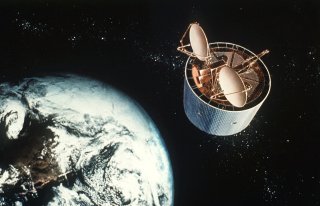Does the United States Need a Reserve Space Fleet?
Government-mandated excess capacity for spacecraft may prove counterproductive.
Spare satellites are critical for national security—or so the Defense Department believes. In recent months, space policymakers have explored creating a reserve space fleet. They argue that owning backup satellites, rockets, and remote sensing equipment—what economists call “excess capacity”—is a prudent response to growing space threats, especially from China. “It is better to have it and not need it than need it and not have it,” as the old maxim goes. However, it’s far from certain these policies achieve their desired results.
The idea behind excess capacity is simple: governments take steps to maintain larger stocks of important assets than private parties alone would create. For example, the Civil Reserve Air Fleet program, established by Washington after the Berlin airlift, allows the U.S. government to use planes owned by participating commercial airlines during a crisis. The government pays to use the aircraft and gives airlines preferential status when bidding for contracts. Undoubtedly, the program means there are more unused planes than otherwise. For those who fled on those planes during the Afghanistan evacuation, that’s a feature, not a bug.
Historically, excess capacity considerations featured prominently in naval policy. The British Navigation Acts of the seventeenth century are a prime example. A pillar of the imperial-mercantilist regime, the Acts required British goods to be shipped on British ships with British crews. This undoubtedly resulted in excess profits for shipowners at the expense of reduced trade and higher prices for consumers—including the American colonists, who eventually took such great umbrage at these policies (among others) that they separated from the mother country. But it also meant the government could prepare the navy for war faster. Given frequent conflicts with the Dutch, another great maritime power, policies ensuring an ample stock of seaworthy vessels and experienced sailors were prudent for national security.
Adam Smith, the godfather of modern economics, did the world a service by debunking the mercantilist argument that maintaining a favorable trade balance was the key to national wealth. But even he could not totally condemn the Navigation Acts. Although he recognized these protectionist measures were hotbeds of cronyism, he also believed they weakened the Dutch, making British shipping safer. Defense is “of much more importance than opulence,” Smith counseled in The Wealth of Nations. The logic of his argument is the same today as it was 250 years ago.
Similar to the Navigation Acts, the Jones Act in the U.S. reserves trade between American ports to American-made, American-owned, and American-crewed ships. There is no question this makes shipping more costly than otherwise. The justification for the law is maintaining a healthy domestic shipbuilding industry and a robust merchant marine to augment regular naval forces.
Most economists think the Jones Act is a lousy piece of legislation. But not all. Joshua Hendrickson, chair of the economics department at the University of Mississippi, has a contrarian perspective on U.S. maritime policy. Hendrickson finds merit in the classic argument that shipbuilders and the merchant marine, which “can be used for sealift and otherwise diverted or requisitioned for defense purposes,” provide a valuable service during conflicts. Hence the Jones Act should thus be interpreted as a strategic bargain between the government and maritime sectors to maintain national readiness.
Hendrickson claims Jones Act critics overestimate the costs of the law because they get the counterfactual wrong. Repealing the Act would require foreign-flagged ships to “be subject to the same tax, labor, and immigration laws as U.S.-flagged ships.” In a world of second-best policies, government-protected profits for the maritime sector are an adaptive response to the social benefits of having a ready naval auxiliary.
But many trade policy analysts deny this works in practice. Writing for the Cato Institute, Colin Grabow contends the Jones Act has instead caused “dwindling numbers of ships, mariners, and shipyards.” In other words, he claims that the law cannot be justified even on national security grounds. In place of the Jones Act, Grabow recommends establishing a civilian merchant marine reserve, subsidizing wages for merchant mariners, and using foreign mariners during wartime.
All of this is relevant to space policy. There’s growing consensus that space is a warfighting domain. Accordingly, the U.S. Space Force is considering a program called the Commercial Augmentation Space Reserves to ensure an adequate supply of space materiel. America’s armed forces increasingly rely on space-based assets, such as satellite communications networks, for force coordination and projection. What once was the realm of science fiction is now a live concern, as the importance of Starlink satellite internet to Ukraine’s defense recently showed. International rivals such as China and Russia are becoming increasingly adept at targeting space assets; as conflict looms, it’s more important than ever to ensure replacements can be mobilized quickly.
But investments in excess capacity might not be the right approach. Such investments may seem like an obviously desirable insurance policy. The problem is that humans are fallible, and sometimes policymakers act out of self-interest. Private businesses, too, regularly game the system to secure political profits. All excess-capacity policies ultimately grant such profits to privileged suppliers, who will not easily relinquish them even when required by the national interest. If the attempt to bolster supplies hollows out the industries it’s meant to protect, as Jones Act critics contend, we will get the worst of both worlds.
Government-created excess capacity has been a fact of economic and political life for centuries. It isn’t going away anytime soon. But that doesn’t mean we can wash our hands of the debate. As America confronts rising hostile powers and revanchist nations across the globe, we must determine whether these policies actually make us safer and freer.
Alexander William Salter is the Georgie G. Snyder Associate Professor of Economics in the Rawls College of Business at Texas Tech University, a research fellow at TTU’s Free Market Institute, and a Young Voices contributor.
Image: Shutterstock.

